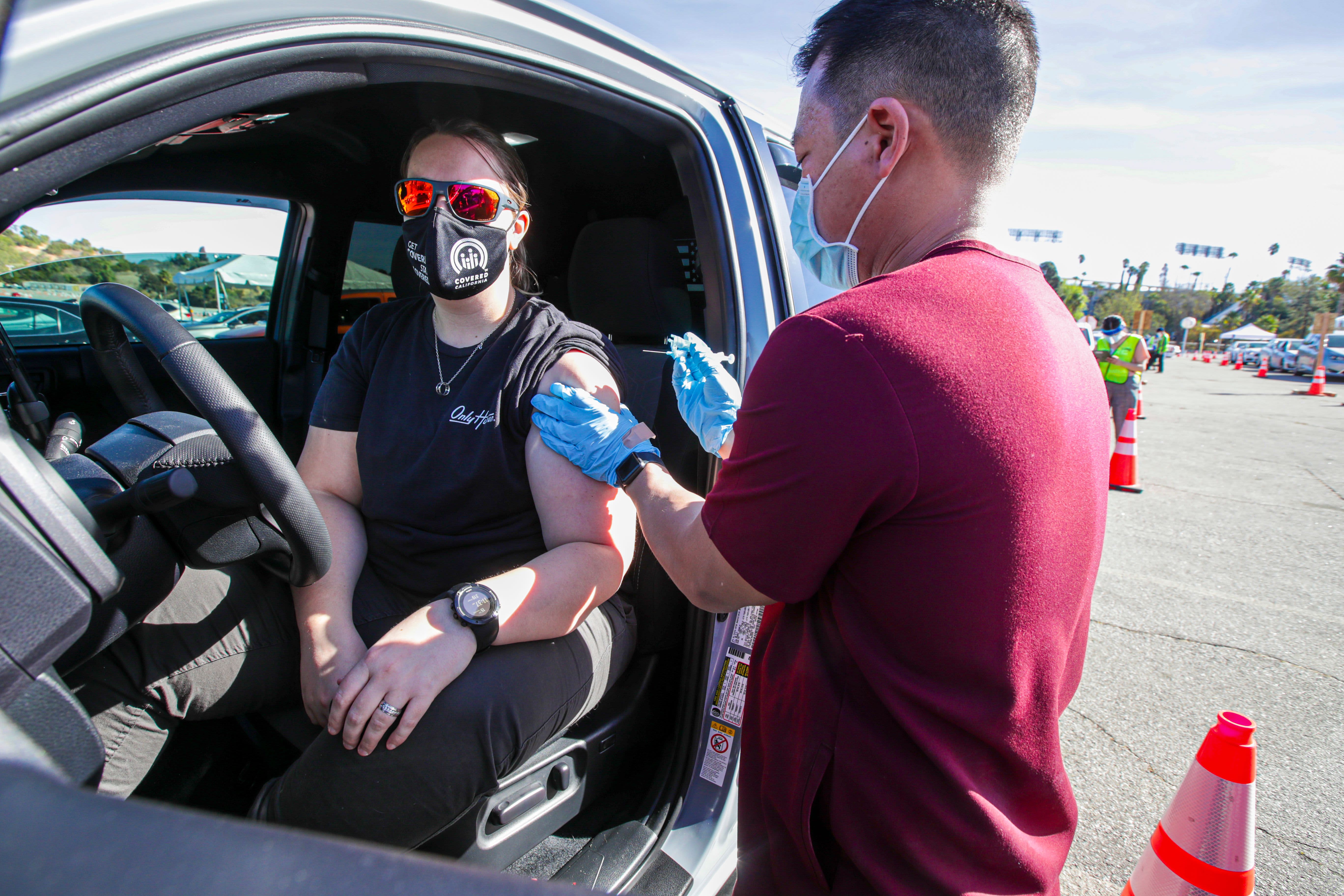
Doctor Richard Dang (R), Assistant professor USC School of Pharmacy, administers a Covid-19 vaccine to Ashley Van Dyke as mass-vaccination of healthcare workers takes place at Dodger Stadium on January 15, 2021 in Los Angeles, California.
Irfan Khan | AFP | Getty Images
As President Joe Biden makes quelling the Covid-19 crisis his first priority in office, American voters are slightly more optimistic about the pandemic now than they were last fall, according to a new NBC News poll.
Still, many respondents are unhappy with the country’s sluggish vaccine rollout, and a majority blame the federal government, the survey found.
The poll findings released Thursday showed that 38% of registered voters believe the worst of the health crisis is behind the country, while 44% believe the worst is yet to come. In a poll conducted shortly before the November election, those figures were 25% and 55%, respectively.
In his inaugural address Wednesday, Biden warned of a difficult fight against the coronavirus ahead.
“We are entering what may well be the toughest and deadliest period of the virus,” he said.
The country is recording at least 193,600 new coronavirus cases and at least 3,030 Covid-related deaths each day, based on a seven-day average calculated by CNBC using Johns Hopkins University data. New, more infectious strains of the virus have appeared in the U.S. At least 406,000 Americans have died from the virus since the pandemic began early last year.
The U.S. failed to meet its target of vaccinating 20 million people by the end of 2020. Under former President Donald Trump’s administration, just over 14.2 million people had received one or more doses of the Covid-19 vaccine as of Wednesday morning, according to CDC data.
While respondents to the NBC poll expressed a slight uptick in optimism about the pandemic, more than half of participants were unhappy with the rollout of vaccines so far: 30% said vaccine administration has gone poorly, while 25% said it has gone “not too well.”
Another 11% said it has been handled “very” well, and 31% responded that it has gone “fairly” well.
Among those who said the rollout has been subpar, 64% primarily blamed the federal government, while 21% blamed state governments. Another 11% blamed both equally.
Responses diverged across party lines. Among Democratic voters critical of the vaccine rollout, 79% blamed the federal government. Among Republicans unhappy with the distribution, 52% blamed states.
The poll surveyed 1,000 registered voters nationwide from Jan. 10 to Jan. 13. It has a margin of error of plus or minus 3.1 percentage points.
Biden’s plan
Biden aims to expedite the rollout of vaccines by increasing funding to local and state officials, creating more vaccination sites and launching a national public education campaign, according to his Covid response plan released Thursday. Previously, Biden said his administration will seek to administer 100 million vaccine shots in its first 100 days.
His incoming health officials have expressed dismay at the state of the federal vaccine distribution plan.
“What we’re inheriting from the Trump administration is so much worse than we could have imagined,” Jeff Zients, Biden’s coordinator for the Covid response, told reporters. “We have to vaccinate as much of the U.S. population as possible to put this pandemic behind us, but we don’t have the infrastructure.”
On his first day in office, Biden reestablished the national security team responsible for global health, security and biodefense, asked agencies to extend nationwide moratoriums on evictions and foreclosures, and asked the Department of Education to extend the pause on student loan payments and interest.
The president has also issued a mask mandate for anyone visiting a federal building or federal land or using certain modes of public transportation. Biden launched a 100-day masking challenge asking Americans to wear face coverings in public for the next 100 days.
Passing a new Covid relief package will be a challenge for the new Congress and White House. Democrats hold thin majorities in both houses of Congress, and Republicans are skeptical of increased spending.
“We must set aside the politics and finally face this pandemic as one nation,” Biden said Wednesday.




